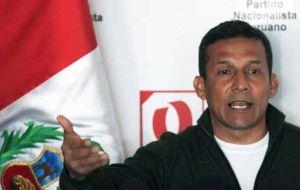MercoPress. South Atlantic News Agency
Peruvian ultra nationalist leads April 10 presidential election opinion polls
 Ollanta Humala promises to tax mining companies’ windfall earnings and re-negotiate some contracts
Ollanta Humala promises to tax mining companies’ windfall earnings and re-negotiate some contracts Ultra nationalist former military officer Ollanta Humala has knocked out former president Alejandro Toledo as the leading candidate for Peru’s tightest presidential campaign in recent history.
With less than two weeks for voting day April 10 and in spite of his narrow lead Humala would struggle to win a runoff, according to two polls published on Sunday.
Humala led the polls by Ipsos and CPI by 1 or 2 percentage points, within the margin of error. Pollsters said any two of the five main candidates in the tight race could make it to a second-round vote on June 5 after the first round on April 10, when no candidate is expected to win a majority of votes.
Close behind Humala, whose rise has unsettled financial markets, were former President Alejandro Toledo and lawmaker Keiko Fujimori, the daughter of jailed former President Alberto Fujimori. Slightly farther back were former Lima Mayor Luis Castañeda and former Prime Minister Pedro Pablo Kuczynski.
In the Ipsos poll, Humala had 21%, followed by Toledo at 20% and Fujimori at 19%. Kuczynski had 15% and Castañeda 14%.
Humala led the CPI poll with 21.2%, followed by Fujimori at 19%, Toledo at 18.6%, Kuczynski at 16.1% and Castañeda at 15.5%.
Both polls showed Humala would lose to every major rival in a runoff, but run a tight race if matched against Kuczynski, a former Prime Minister, banker and Wall Street executive.
The CPI poll of 668 people was conducted from Monday to Thursday. The sample size and dates for the Ipsos survey were not immediately available. Both polls had margins of error of about 2 points.
Peru is one of the world's fastest-growing economies, having expanded 9% last year. All the main candidates in the race support market-friendly economic policies in place for the past two decades, but Humala has a tense relationship with the business community because of a radical past.
Although Humala has moderated his tone since nearly winning the 2006 race and distanced himself from his one-time ally, Venezuelan President Hugo Chavez, his rise contributed to volatility in local financial markets in recent days.
Peru's Sol currency sank to a two-month low against the US dollar last week, while the costs of insuring Peruvian sovereign bonds rose.
Humala says he is committed like his rivals to fiscal responsibility and low inflation, but his calls to raise taxes on the country's vast mining industry or renegotiate terms of some contracts have bothered executives.
His advance from 7% only a month ago has picked up speed in spite of a ferocious campaign from most Peruvian media that claim Humala’s government plan is “state driven in economics and politically authoritarian” and have painted him as a wolf dressed in a lamb’s skin.




Top Comments
Disclaimer & comment rulesCommenting for this story is now closed.
If you have a Facebook account, become a fan and comment on our Facebook Page!